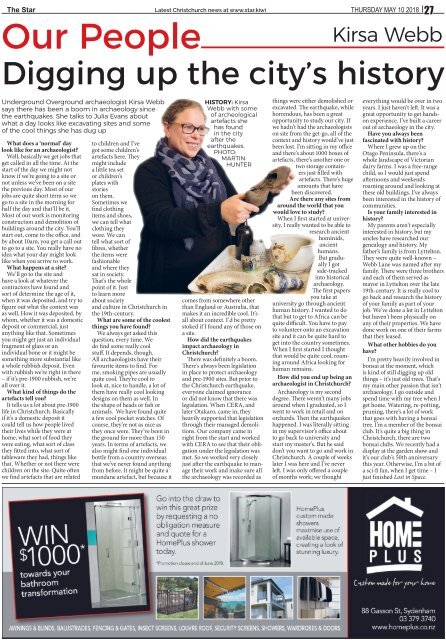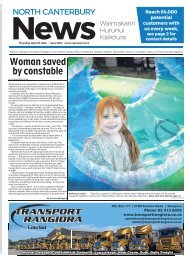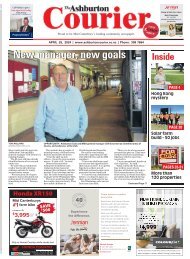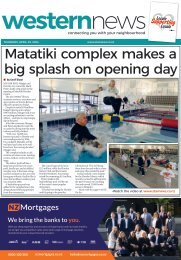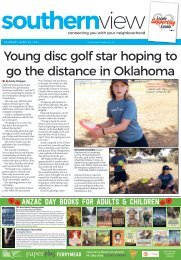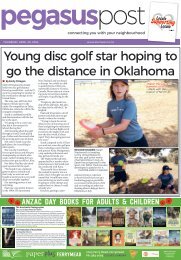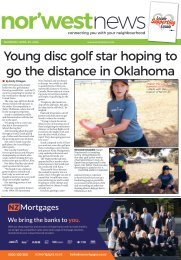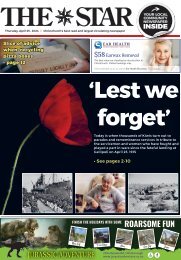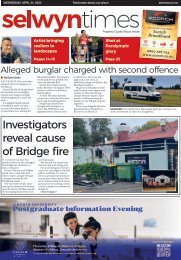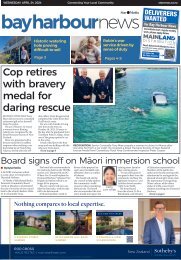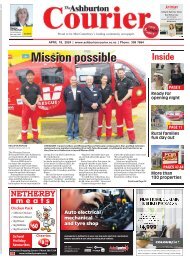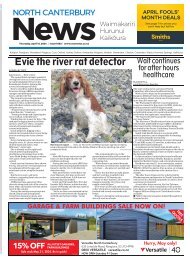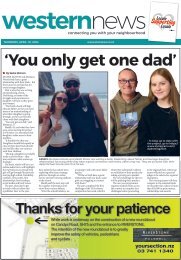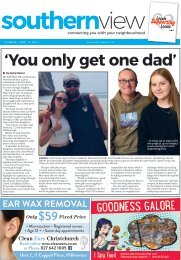The Star: May 10, 2018
You also want an ePaper? Increase the reach of your titles
YUMPU automatically turns print PDFs into web optimized ePapers that Google loves.
<strong>The</strong> <strong>Star</strong> Latest Christchurch news at www.star.kiwi<br />
Thursday <strong>May</strong> <strong>10</strong> <strong>2018</strong> 27<br />
Our People<br />
Kirsa Webb<br />
Digging up the city’s history<br />
Underground Overground archaeologist Kirsa Webb<br />
says there has been a boom in archaeology since<br />
the earthquakes. She talks to Julia Evans about<br />
what a day looks like excavating sites and some<br />
of the cool things she has dug up<br />
What does a ‘normal’ day<br />
look like for an archaeologist?<br />
Well, basically we get jobs that<br />
get called in all the time. At the<br />
start of the day we might not<br />
know if we’re going to a site or<br />
not unless we’ve been on a site<br />
the previous day. Most of our<br />
jobs are quite short term so we<br />
go to a site in the morning for<br />
half the day and that’ll be it.<br />
Most of our work is monitoring<br />
construction and demolition of<br />
buildings around the city. You’ll<br />
start out, come to the office, and<br />
by about <strong>10</strong>am, you get a call out<br />
to go to a site. You really have no<br />
idea what your day might look<br />
like when you arrive to work.<br />
What happens at a site?<br />
We’ll go to the site and<br />
have a look at whatever the<br />
contractors have found and<br />
sort of determine the age of it,<br />
when it was deposited, and try to<br />
figure out what the context was<br />
as well. How it was deposited, by<br />
whom, whether it was a domestic<br />
deposit or commercial, just<br />
anything like that. Sometimes<br />
you might get just an individual<br />
fragment of glass or an<br />
individual bone or it might be<br />
something more substantial like<br />
a whole rubbish deposit. Even<br />
with rubbish we’re right in there<br />
– if it’s pre-1900 rubbish, we’re<br />
all over it.<br />
What kind of things do the<br />
artefacts tell you?<br />
It tells us a lot about pre-1900<br />
life in Christchurch. Basically<br />
if it’s a domestic deposit it<br />
could tell us how people lived<br />
their lives while they were at<br />
home, what sort of food they<br />
were eating, what sort of class<br />
they fitted into, what sort of<br />
tableware they had, things like<br />
that. Whether or not there were<br />
children on the site. Quite often<br />
we find artefacts that are related<br />
to children and I’ve<br />
got some children’s<br />
artefacts here. <strong>The</strong>y<br />
might include<br />
a little tea set<br />
or children’s<br />
plates with<br />
stories<br />
on them.<br />
Sometimes we<br />
find clothing<br />
items and shoes,<br />
we can tell what<br />
clothing they<br />
wore. We can<br />
tell what sort of<br />
fibres, whether<br />
the items were<br />
fashionable<br />
and where they<br />
sat in society.<br />
That’s the whole<br />
point of it. Just<br />
to learn more<br />
about society<br />
and culture in Christchurch in<br />
the 19th-century.<br />
What are some of the coolest<br />
things you have found?<br />
We always get asked this<br />
question, every time. We<br />
do find some really cool<br />
stuff. It depends, though.<br />
All archaeologists have their<br />
favourite items to find. For<br />
me, smoking pipes are usually<br />
quite cool. <strong>The</strong>y’re cool to<br />
look at, nice to handle, a lot of<br />
them have really cool looking<br />
designs on them as well. In<br />
the shape of heads or fish or<br />
animals. We have found quite<br />
a few cool pocket watches. Of<br />
course, they’re not as nice as<br />
they once were. <strong>The</strong>y’ve been in<br />
the ground for more than 150<br />
years. In terms of artefacts, we<br />
also might find one individual<br />
bottle from a country overseas<br />
that we’ve never found anything<br />
from before. It might be quite a<br />
mundane artefact, but because it<br />
HISTORY: Kirsa<br />
Webb with some<br />
of archeological<br />
artefacts she<br />
has found<br />
in the city<br />
after the<br />
earthquakes.<br />
PHOTO:<br />
MARTIN<br />
HUNTER<br />
comes from somewhere other<br />
than England or Australia, that<br />
makes it an incredible cool. It’s<br />
all about context. I’d be pretty<br />
stoked if I found any of those on<br />
a site.<br />
How did the earthquakes<br />
impact archaeology in<br />
Christchurch?<br />
<strong>The</strong>re was definitely a boom.<br />
<strong>The</strong>re’s always been legislation<br />
in place to protect archaeology<br />
and pre-1900 sites. But prior to<br />
the Christchurch earthquake,<br />
everyone claimed ignorance<br />
or did not know that there was<br />
legislation. When CERA, and<br />
later Otakaro, came in, they<br />
heavily supported that legislation<br />
through their managed demolitions.<br />
Our company came in<br />
right from the start and worked<br />
with CERA to see that their obligation<br />
under the legislation was<br />
met. So we worked very closely<br />
just after the earthquake to manage<br />
their work and make sure all<br />
the archaeology was recorded as<br />
things were either demolished or<br />
excavated. <strong>The</strong> earthquake, while<br />
horrendous, has been a great<br />
opportunity to study our city. If<br />
we hadn’t had the archaeologists<br />
on site from the get-go, all of the<br />
context and history would’ve just<br />
been lost. I’m sitting in my office<br />
and there’s about <strong>10</strong>00 boxes of<br />
artefacts, there’s another one or<br />
two storage containers<br />
just filled with<br />
artefacts. <strong>The</strong>re’s huge<br />
amounts that have<br />
been discovered.<br />
Are there any sites from<br />
around the world that you<br />
would love to study?<br />
When I first started at university,<br />
I really wanted to be able to<br />
research ancient<br />
hominids,<br />
ancient<br />
humans.<br />
But gradually<br />
I got<br />
side-tracked<br />
into historical<br />
archaeology.<br />
<strong>The</strong> first papers<br />
you take at<br />
university go through ancient<br />
human history. I wanted to do<br />
that but to get to Africa can be<br />
quite difficult. You have to pay<br />
to volunteer onto an excavation<br />
site and it can be quite hard to<br />
get into the country sometimes.<br />
When I first started I thought<br />
that would be quite cool, roaming<br />
around Africa looking for<br />
human remains.<br />
How did you end up being an<br />
archaeologist in Christchurch?<br />
Archaeology is my second<br />
degree. <strong>The</strong>re weren’t many jobs<br />
around when I graduated, so I<br />
went to work in retail and on<br />
orchards. <strong>The</strong>n the earthquakes<br />
happened. I was literally sitting<br />
in my supervisor’s office about<br />
to go back to university and<br />
start my master’s. But he said<br />
don’t you want to go and work in<br />
Christchurch. A couple of weeks<br />
later I was here and I’ve never<br />
left. I was only offered a couple<br />
of months work; we thought<br />
everything would be over in two<br />
years. I just haven’t left. It was a<br />
great opportunity to get handson<br />
experience. I’ve built a career<br />
out of archaeology in the city.<br />
Have you always been<br />
fascinated with history?<br />
Where I grew up on the<br />
Otago Peninsula, there’s a<br />
whole landscape of Victorian<br />
dairy farms. I was a free-range<br />
child, so I would just spend<br />
afternoons and weekends<br />
roaming around and looking at<br />
these old buildings. I’ve always<br />
been interested in the history of<br />
communities.<br />
Is your family interested in<br />
history?<br />
My parents aren’t especially<br />
interested in history, but my<br />
uncles have researched our<br />
genealogy and history. My<br />
father’s family is from Lyttelton.<br />
<strong>The</strong>y were quite well-known –<br />
Webb Lane was named after my<br />
family. <strong>The</strong>re were three brothers<br />
and each of them served as<br />
mayor in Lyttelton over the late<br />
19th-century. It is really cool to<br />
go back and research the history<br />
of your family as part of your<br />
job. We’ve done a lot in Lyttelton<br />
but haven’t been physically on<br />
any of their properties. We have<br />
done work on one of their farms<br />
that they leased.<br />
What other hobbies do you<br />
have?<br />
I’m pretty heavily involved in<br />
bonsai at the moment, which<br />
is kind of still digging up old<br />
things – it’s just old trees. That’s<br />
my main other passion that isn’t<br />
archaeology. I go outside and<br />
spend time with my tree when I<br />
get home. Watering, re-potting,<br />
pruning, there’s a lot of work<br />
that goes with having a bonsai<br />
tree. I’m a member of the bonsai<br />
club. It’s quite a big thing in<br />
Christchurch, there are two<br />
bonsai clubs. We recently had a<br />
display at the garden show and<br />
it’s our club’s 50th anniversary<br />
this year. Otherwise, I’m a bit of<br />
a sci-fi fan, when I get time – I<br />
just finished Lost in Space.


